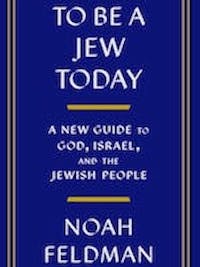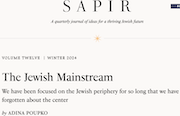
The Jewish world’s attention continues to be focused on Israel and antisemitism. There have been mentions in the media of increased interest in Jewish identity, but they haven’t been connected with inclusion of interfaith families. The topic apparently was not discussed on the agenda or the sidelines at either the Jewish Funders Network or CCAR conferences in March.
One significant development was the release of prominent Harvard Law School professor Noah Feldman’s new book, To Be a Jew Today – A New Guide to God, Israel and the Jewish People. Attention to the book has, not surprisingly, focused on what it says about Israel. But as my enthusiastic review published on the Times of Israel blogs says, Feldman offers A Fresh Perspective on Interfaith Marriage.
Feldman explains how the strong taboo against interfaith marriage has been overcome among progressive Jews by the competing values of free choice and romantic love. I was heartened by two points. First, Feldman suggests that traditional Jews could evolve Jewish law that they consider binding so as to accommodate interfaith marriages, as some have for gay marriages. Second, in what sounds like a radically inclusive Judaism in which partners from different faith traditions are thought of and treated as equal, he says that “the only challenge left” for progressive Jews “is to reframe the acceptance of interfaith marriage as affirmatively positive,” not just a reluctant concession to reality. I hope Feldman’s thinking on interfaith marriage gets the attention among Jewish leaders that it deserves.
 Another significant development was the announcement of an important partnership between ADL and 18Doors that will address the need for programs and resources on antisemitism specifically for interfaith couples. As Jodi Bromberg said, “Couples and family members come from a place of love, connection and shared humanity—and yet, these conversations around antisemitism and allyship can be hard to navigate.” This partnership is a clear sign that the ADL recognizes the importance of helping interfaith couples remain allies and feel included in Jewish communities.
Another significant development was the announcement of an important partnership between ADL and 18Doors that will address the need for programs and resources on antisemitism specifically for interfaith couples. As Jodi Bromberg said, “Couples and family members come from a place of love, connection and shared humanity—and yet, these conversations around antisemitism and allyship can be hard to navigate.” This partnership is a clear sign that the ADL recognizes the importance of helping interfaith couples remain allies and feel included in Jewish communities.
II do remain worried that statements, like one in the Boston Globe this week, that the Jewish people “are fundamentally alone,” and ongoing calls for strengthening Jewish peoplehood, by focusing on the “mainstream,” and putting our own oxygen masks on first, could result in pushing interfaith families and partners from different faith backgrounds away. I’m seeing more emails coming from Jewish organizations and professionals ending with “Am Yisrael Chai!” It’s a sentiment I share – may the Jewish people live and thrive.
But “Jewish people” is a shorthand term susceptible to different interpretation. It could mean Jews only. But it could include partners from different faith backgrounds who are not Jewish themselves. As I’ve said before, I wish people would use the term “Jewish community” because it’s more inclusive. The partners from different faith backgrounds and their extended families are the natural allies of the Jewish people – and the Jewish community needs all the allies it can get.
 It’s very tricky. In The Jewish Mainstream, Adina Poupko writes that the Natan Fund, which she leads, has paid close attention to “outliers” – people not yet included in Jewish communal life – as “an early funder of LGBTQ inclusion, Jewish farming and environmentalism, new models of synagogues and grassroots communities, and Jewish arts and culture.” (She could have included interfaith families among her outliers – when I ran InterfaithFamily (now 18Doors), Natan was a very influential early funder).
It’s very tricky. In The Jewish Mainstream, Adina Poupko writes that the Natan Fund, which she leads, has paid close attention to “outliers” – people not yet included in Jewish communal life – as “an early funder of LGBTQ inclusion, Jewish farming and environmentalism, new models of synagogues and grassroots communities, and Jewish arts and culture.” (She could have included interfaith families among her outliers – when I ran InterfaithFamily (now 18Doors), Natan was a very influential early funder).
But now, with Israel and the Jewish people at war on many fronts, she says we need to direct more of our funding to “the mainstream”:
“We need to shift from meeting people ‘where they are’ to providing them with opportunities to learn and engage and invite them over to where we are, where most Jews are. We shouldn’t be so accommodating that we turn our communities upside down or compromise on core tenets that are existentially important to nearly all of us.”
Poupko thankfully is careful to say that she’s not suggesting “that we put our support for the outliers on hold.” The point of her essay may be that anti-Zionists should not be accommodated, which is a whole other question. But it would be terrible if Jewish leaders start thinking that, and acting like, we shouldn’t be accommodating to those not yet included in Jewish life.
Finally, Rabbi Moshe Hauer, executive vice president of the Orthodox Union, writes that in the aftermath of October 7 Jews have been “made to feel utterly alone by the hostility of the world,” but that ironically the Jewish spirit of many has been awakened – what he calls “a tidal wave of prosemitism.” Rabbi Hauer caught my eye when he said that we must figure out how to lock in the wave of prosemitism “for those who have yet to firmly establish themselves within the Jewish communal family.” Given the Orthodox Union’s past statements, I doubt that Rabbi Hauer had interfaith families and partners from different faith backgrounds in mind. But there’s always hope.
Also worth reading:
- In Kriah and a Crucifix: A Rabbi’s Story of Interfaith Mourning Rabbi Simon Stratford, an 18Doors Rukin Fellow, writes that “I’ve realized that in a person’s darkest hours, my role as a rabbi isn’t to set boundaries and limit the participation of mourners but rather to do what I can to make them feel included and supported in their grief.”
- In The Story of Esther, the Story of Us, Crystal Hill relates her own interfaith family to Purim’s story of Esther’s interfaith family and current concerns about expressing identity.
- A group of Orthodox Church and Catholic Church representatives are recommending that the Orthodox Church and the Catholic Church take steps to recognize each others’ marriages.

Leave a Reply